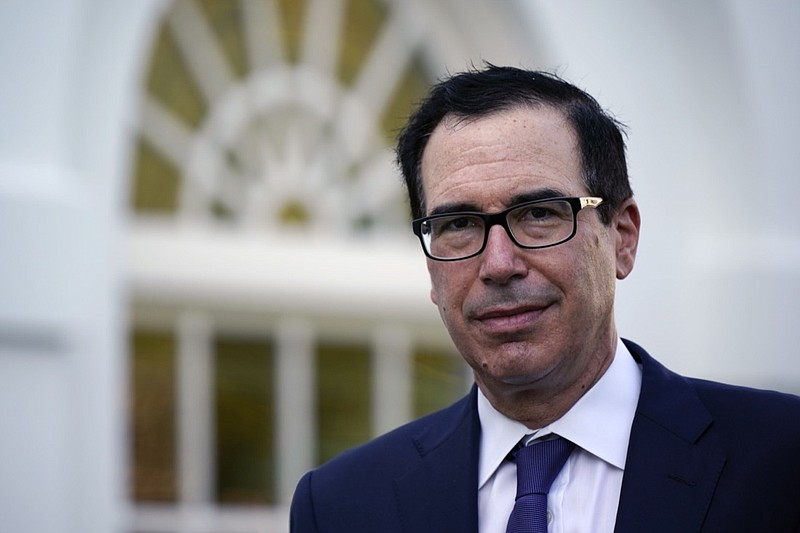U.S. federal deficit up from record high
The U.S. government's deficit in the first three months of the budget year was a record-breaking $572.9 billion, 60.7% higher than the same period a year ago, as spending to deal with the COVID-19 pandemic pushed outlays up while revenue declined.
The Treasury Department reported Wednesday that with three months gone in the budget year, the deficit was $216.3 billion higher than the same October-December period a year ago.
The deficit, the shortfall between what the government collects in taxes and what it spends, reflects an 18.3% jump in outlays to $1.38 trillion, a record for the period, while revenues fell 0.4% to $803.37 billion. The deficit is the difference between revenue collections and outlays.
For just the month of December, the deficit totaled a record $143.6 billion.
The deficit for the 2020 budget year, which ended Sept. 30, climbed to an all-time high of $3.1 trillion. Beginning in the spring, Congress passed trillion-dollar-plus spending measures to combat the harm being done to the economy from a pandemic-induced downturn.
China exports halted for cotton, tomatoes
The U.S. government announced Wednesday that it will halt imports of cotton and tomatoes from the Uighur region of China in its most sweeping action yet to pressure the Communist Party over its campaign against ethnic minorities.
Officials said Customs and Border Protection will use its authority to block products suspected of being produced with forced labor to keep out cotton, tomatoes and related products from the Xinjiang region of northwest China.
Xinjiang is a major global supplier of cotton, so the order could have significant effects on international commerce. The Trump administration has already blocked imports from individual companies linked to forced labor in the region, and the U.S. has imposed sanctions on Communist Party officials with prominent roles in the campaign.
The order will put economic pressure not just on China but major global retailers who unwittingly or otherwise import goods produced by people under conditions that are akin to modern-day slavery.
"Any global apparel brand that is not either out of Xinjiang already, or plotting a very swift exit, is courting legal and reputational disaster," said Scott Nova, executive director of the Worker Rights Consortium, which includes labor and human rights groups. "The days when any major apparel brand can safely profit from Xinjiang cotton are over."
Amazon says Parler violated content rules
Amazon.com, Inc. has asked a federal judge to deny a request to reinstate the cloud-service account for conservative social media network Parler, claiming Parler shrugged off police violence content on its site before and after the insurrection at the U.S. Capitol.
Amazon's lawyers made the claim on Tuesday, a day after Parler on Monday filed a lawsuit against Amazon claiming a breach of contract and antitrust violation after its account was suspended and effectively removed from the internet, The Seattle Times reported.
The lawsuit claims Amazon colluded with Twitter to "kill Parler's business - at the very time it is set to skyrocket," the complaint said.
Amazon's attorneys, Ambika Doran and Alonzo Wickers, said there was no merit to Parler's claims and that the case centered on Parler's "demonstrated unwillingness" to remove content that threatens public safety.
Amazon argued that the lack of content moderation led to a "steady increase" in violent content, a violation of its terms of service.
Amazon said Parler contracted with the company in 2018 and agreed not to host harmful content. Amazon also notified Parler that it retained the right to suspend accounts immediately if they breach Amazon's terms of service.
International flyers must get COVID tests
All international travelers flying to the United States will soon be required to get tested for COVID-19, the Centers for Disease Control and Prevention announced Tuesday.
While other countries around the world have put in similar requirements, the U.S. has not previously required such tests for travelers entering the country. CDC Director Robert Redfield signed Tuesday an order that will take effect Jan. 26, 2021.
A test for the virus with negative results taken within three days of a flight will be required before departure to the U.S., with a paper or electronic copy of the lab test result or documentation of recovery from COVID-19 provided to the airline. Those without such documents will be denied boarding by the airline.
The CDC said the testing or recovery documentation will be required regardless of whether travelers have been vaccinated.
The CDC is also recommending travelers get tested again three to five days after arriving in the U.S. and that international travelers stay home seven days after their flights. But there is no quarantine requirement.
"With the US already in surge status, the testing requirement for air passengers will help slow the spread of the virus as we work to vaccinate the American public," the CDC said in a press release.
YouTube suspends Trump's channel
YouTube said Tuesday that it had suspended President Donald Trump's channel over concern about "ongoing potential for violence," the latest move by one of the large technology companies to limit the president online.
In a post on YouTube's official Twitter account, the Google-owned video site said it had suspended Trump's account after one of his recent videos violated its policy for inciting violence.
That meant Trump would not be able to upload new content to his channel, which had about 2.8 million subscribers, for at least seven days. YouTube also said it was disabling all comments on his channel indefinitely.
Older videos that did not violate any policies remained active on his channel.
